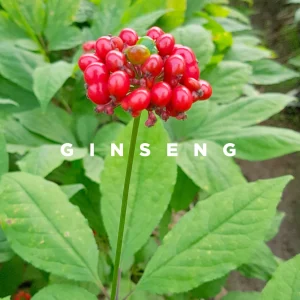
Ginseng is a popular herbal remedy with a variety of potential health benefits. Below is a detailed overview of the benefits of ginseng and the different types of ginseng, as well as how their properties vary.
Key Benefits of Ginseng
- Boosts Energy Levels
- Ginseng is often used as a natural remedy to combat fatigue and boost energy. It enhances physical and mental performance by improving stamina.

- Ginseng is often used as a natural remedy to combat fatigue and boost energy. It enhances physical and mental performance by improving stamina.
- Improves Cognitive Function
- Ginseng may support memory, focus, and mental clarity. It’s particularly valued for its potential role in preventing age-related cognitive decline.
- Enhances Immunity
- Ginseng has immune-boosting properties and may help the body resist infections and diseases, including colds and flu.
- Supports Stress Management
- Known as an adaptogen, ginseng helps the body cope with stress by balancing cortisol levels and reducing anxiety.
- Improves Sexual Health
- Ginseng has been linked to enhanced sexual performance and libido. It may be effective for conditions like erectile dysfunction.
- Regulates Blood Sugar
- Ginseng can help lower blood sugar levels and improve insulin sensitivity, which is beneficial for managing diabetes.
- Antioxidant and Anti-Inflammatory Properties
- Rich in ginsenosides (active compounds), ginseng reduces oxidative stress and inflammation, supporting overall health and preventing chronic diseases.
- Cardiovascular Health
- Ginseng may improve circulation, lower blood pressure, and reduce the risk of cardiovascular diseases.
- Skin Health
- The antioxidant properties of ginseng make it a popular ingredient in skincare products to promote anti-aging and skin rejuvenation.
Different Types of Ginseng and Their Uses
- Panax Ginseng (Asian/Red Ginseng)
- Origin: Korea, China, and other parts of Asia.
- Benefits: Known for boosting energy, reducing fatigue, and enhancing immunity. It’s also used for sexual health and improving cognitive functions.
- Properties: Warm in nature, making it ideal for cold climates and for individuals with low energy.

- American Ginseng (Panax Quinquefolius)
- Origin: North America.
- Benefits: Calms the mind, improves focus, reduces stress, and boosts immunity. It’s often used to regulate blood sugar and combat heat-related conditions.
- Properties: Cooler in nature, making it suitable for hot climates or those with excess internal heat.
- Siberian Ginseng (Eleutherococcus Senticosus)
- Origin: Russia and China.
- Benefits: Known for improving stamina, reducing stress, and enhancing athletic performance. It is also used to support immune function.
- Properties: Different from true ginsengs (Panax species) but still considered an adaptogen.
- Indian Ginseng (Ashwagandha)
- While not a “true ginseng,” Ashwagandha is often grouped due to similar adaptogenic properties. It helps with stress, anxiety, and energy balance.
Key Differences Between Types
- Ginsenoside Content:
- Panax ginseng has higher concentrations of ginsenosides than American ginseng, leading to more potent effects on energy and immunity.
- Thermal Properties:
- Asian ginseng is warming, while American ginseng is cooling, affecting their suitability for different body constitutions and climates.
- Adaptogenic Effects:
- Siberian ginseng is less focused on ginsenosides and more on its ability to enhance endurance and reduce fatigue.
- Cultural and Medicinal Uses:
- Asian ginseng is a staple in Traditional Chinese Medicine (TCM) for vitality and longevity, while American ginseng is used for balancing energy.
If you want to dive deeper into the differences, let me know! I can also tailor this to your needs—whether it’s for a health guide, a personal remedy plan, or general knowledge.
Taking ginseng every day can be healthy for many people, but it depends on the type of ginseng, the dosage, and your individual health status. Here are some key points to consider:
Benefits of Ginseng
- Boosts Energy: Ginseng is often used to combat fatigue and enhance physical and mental energy.

- Improves Immune Function: It may help strengthen the immune system.
- Cognitive Support: Some studies suggest it can improve memory and focus.
- Stress Reduction: Ginseng has adaptogenic properties that may help the body manage stress.
- Supports Blood Sugar Levels: Some types, like American ginseng, may help regulate blood sugar.
Types of Ginseng
- Asian Ginseng (Panax ginseng): Commonly used for energy, cognitive function, and stress.
- American Ginseng (Panax quinquefolius): Generally milder, often used for calming and immune support.
- Siberian Ginseng (Eleutherococcus senticosus): Not a “true” ginseng, but used for energy and stress relief.
Potential Risks of Daily Use
- Overstimulation: In large doses, ginseng can cause jitteriness, insomnia, or headaches.
- Hormonal Effects: Ginseng may affect hormone levels, which might not be suitable for individuals with hormone-sensitive conditions.
- Digestive Issues: It may cause mild gastrointestinal discomfort in some people.
- Drug Interactions: Ginseng can interact with medications such as blood thinners, diabetes drugs, and antidepressants.
General Recommendations
- Dosage: A common daily dose is 200–400 mg of a standardized extract. Check the label or consult a healthcare professional for guidance.
- Cycle Use: Some experts recommend taking ginseng for a few weeks, followed by a break to prevent tolerance or overstimulation.
- Individual Needs: If you have any health conditions, are pregnant, or are on medications, consult a doctor before starting ginseng.
When to Avoid Ginseng
- If you experience side effects like insomnia, nervousness, or digestive discomfort.
- If you have conditions like high blood pressure, heart disease, or autoimmune disorders, without consulting a doctor.




 DailyMediCure
DailyMediCure 









